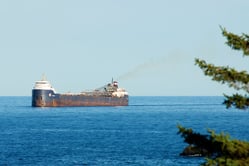
The Deepwater Horizon Oil Spill that occurred in the Gulf of Mexico in 2010 spilled 4.9 million barrels of oil into the Gulf, causing tremendous impacts to the ecosystem. The Exxon Valdez Oil Spill in the Prince William Sound in 1989 also had a tremendous impact on the environment. Impacts of these spills can still be seen, and there is still oil that has not yet been cleaned up on land and in the water.
Cleaning up oil from the coast and water can be tricky. Researchers at the University of Wisconsin, Madison have developed a new material that repels oil underwater, providing the potential to create new materials that will be able to better clean up oil from oil spills.
Researchers David Lynn (lead) and Uttam Manna (assistant), through the manipulation of chemical and topographical properties of a material, created a porous material made from thin polymer films. By using this material as a coating to cover wire mesh, and then pouring a mixture of water and oil through the mesh, they saw that the oil stayed on top of the mesh while the water passed through. They also found that even after damaging the material – in this case, by using sandpaper on it, freezing it, burning it, scratching it – oil was still repelled.
These Wisconsin researchers now plan to find a way to use this materials on larger items, but current results show that using this oil-repellent material makes it easier to collect and recover oil in water.
These new materials have the potential to help in many instances where one chemical needs to be separated from another. David Lynn explained that “We’re not just talking about the potential to develop new tools to help clean up oil spills. It could also be fragrances and pharmaceuticals, fine chemicals or other organic liquids.”
